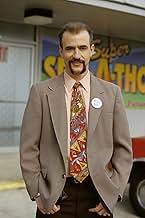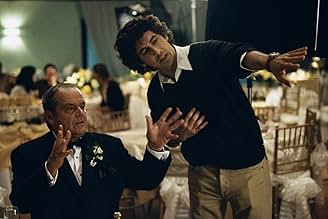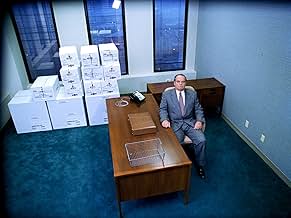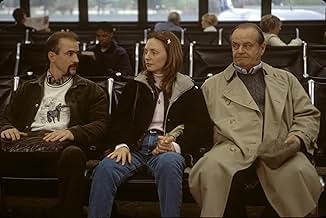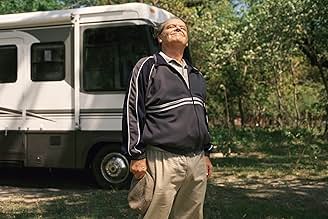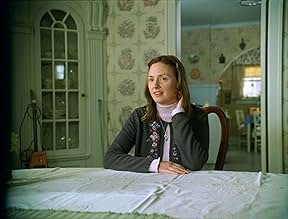Un hombre recientemente jubilado se embarca en un viaje hacia la boda de su hija, solo para descubrir más sobre sí mismo y la vida de lo que esperaba.Un hombre recientemente jubilado se embarca en un viaje hacia la boda de su hija, solo para descubrir más sobre sí mismo y la vida de lo que esperaba.Un hombre recientemente jubilado se embarca en un viaje hacia la boda de su hija, solo para descubrir más sobre sí mismo y la vida de lo que esperaba.
- Dirección
- Guión
- Reparto principal
- Nominado para 2 premios Óscar
- 25 premios y 71 nominaciones en total
James M. Connor
- Randall's Best Man
- (as James Micheal Connor)
Marilyn Tipp
- Neighbor Lady
- (escenas eliminadas)
Reseñas destacadas
I spent a day watching "About Schmidt", with Jack Nicholson... and then the evening rambling through reviews, since my wife's perception of the ending differed somewhat from mine....
Conflict can often lead to enlightenment and discovery, but not so in the case of Warren Schmidt. In his case it leads to a life of complacency, denial, delusion, and passive-aggressive behaviors... and eventually, to a meaningless life of servitude devoid of passion or purpose.
Since my wife and I are around the same age as the character, and we ponder the same issues of our lives, the film had more significance to us. I found the work to be a cinema-graphic piece of art laced with symbolism and dark humor (at best). I likened it to previous movies like "Death of a Salesman", "The Apartment", "The Swimmer" (Burt Lancaster), or a short filmed called "The Bridge".
As a cautionary tale (or social comment) on the "American Way" of life, the messages it conveys are slightly exaggerated, but nevertheless there to be debated. We are talking about identity, achievement, interpersonal relationships, and the "average IQ".
In the end, I believe this film will become one that is studied in future classrooms, and it was brave of Nicholson to participate in such a character study and a work intended primarily for writers, actors, and directors. If laughter is "the sound we make when we are surprised (or shocked) by the truth", then the amount of humor you find in this film may be directly related to your own level of naivety or denial. After all, laughter can often be just another defense mechanism, right?
Some movies are straightforward, some are magical, some are mystical, and then, some are symbolic. This movie falls into the last category. The use of time, space, cognitive dissonance, and Irony abound in this work and challenge us to look, think, and feel.
Notes: we would have cut or altered the "Percodan scene" at the rehearsal (as overdone), also note- the cattle at the funeral who later appear on the freeway, inside jokes about Des Moines and Denver, Randall's "Certificate of Attendance", the look on Jeannie's face at the end of Warren's speech at the Wedding Reception, the use of "overstatement", details of wall decorations, and Warren's obvious attraction to the trite, idealistic, delusional, and superficial.
If you are a thinking, feeling, serious movie-lover, you should SEE this film once, and then STUDY it the 2nd time!
Conflict can often lead to enlightenment and discovery, but not so in the case of Warren Schmidt. In his case it leads to a life of complacency, denial, delusion, and passive-aggressive behaviors... and eventually, to a meaningless life of servitude devoid of passion or purpose.
Since my wife and I are around the same age as the character, and we ponder the same issues of our lives, the film had more significance to us. I found the work to be a cinema-graphic piece of art laced with symbolism and dark humor (at best). I likened it to previous movies like "Death of a Salesman", "The Apartment", "The Swimmer" (Burt Lancaster), or a short filmed called "The Bridge".
As a cautionary tale (or social comment) on the "American Way" of life, the messages it conveys are slightly exaggerated, but nevertheless there to be debated. We are talking about identity, achievement, interpersonal relationships, and the "average IQ".
In the end, I believe this film will become one that is studied in future classrooms, and it was brave of Nicholson to participate in such a character study and a work intended primarily for writers, actors, and directors. If laughter is "the sound we make when we are surprised (or shocked) by the truth", then the amount of humor you find in this film may be directly related to your own level of naivety or denial. After all, laughter can often be just another defense mechanism, right?
Some movies are straightforward, some are magical, some are mystical, and then, some are symbolic. This movie falls into the last category. The use of time, space, cognitive dissonance, and Irony abound in this work and challenge us to look, think, and feel.
Notes: we would have cut or altered the "Percodan scene" at the rehearsal (as overdone), also note- the cattle at the funeral who later appear on the freeway, inside jokes about Des Moines and Denver, Randall's "Certificate of Attendance", the look on Jeannie's face at the end of Warren's speech at the Wedding Reception, the use of "overstatement", details of wall decorations, and Warren's obvious attraction to the trite, idealistic, delusional, and superficial.
If you are a thinking, feeling, serious movie-lover, you should SEE this film once, and then STUDY it the 2nd time!
This film must be watched very carefully. If you're not paying enough attention to it, you would miss it (some did). It's in the frames, the atmosphere, the tiny details, the situations, the acting, everything. But it's not that obvious, unless you enter that world. Simple story? Sure. Life is simple. So is great art. All in all, "About Schmidt" is a really great film. Bitter humor, all-pervading lie, the infinite sadness of loneliness and failure, sincere egoism, everyday dullness, desperate and quiet hope - this is life, and in a non-blatant, nor melodramatic manner. But you're going to weep (and smile) at the ending (I did!). And one more question: is The Mulholland Man the greatest actor ever or not?
It is hard to recommend About Schmidt to anyone, without actually knowing that person. Not only does the story seem unconventionally uneventful to most of modern audiences, but it also moves with an unhurried patience that will let many viewers shift in their seats. It really depends on whether one can develop an interest to the film and its subject matter, which shows a retired man suddenly facing the void and meaninglessness of his existence.
About Schmidt moves slowly, but it moves with grace. The film's success is deeply in debt to Jack Nicholson, subordinating his personality to the character of Warren Schmidt. It must have been difficult for somebody like Nicholson to display the role's required lack of passion without letting Schmidt lose his human touch. Yet, his portrayal is excellent in its understatement, and his numerable supporting actors do not disappoint either. Fans of Nicholson will be assured in their belief, that their favourite is not only one of the best, but also one of the most versatile actors still working today.
Apart from the acting, director Alexander Payne's film is also well crafted. The somewhat saddened mood is only enhanced by documentary-like shots, constantly making us aware that what we witness is really an everyday-tragedy. The script shows intelligence, and although it contains many subtleties, most of them will not go unnoticed with attentive viewers. Even though About Schmidt is billed as a comedy, it really is a drama. Many of the humorous situations are more tragic than funny, and truly hilarious moments are rare occurrences.
I've often wondered whether the title of About Schmidt has been chosen with any clear intent. The German surname Schmidt equals Smith in English and is one of the most common. So about Schmidt could actually mean "About Everybody". Everybody can wake up one day and discover that everything he or she has devoted himself to, amounts to nothing. It's a frequent social phenomenon, that people suddenly wise up that their lives are almost over, without ever having fully lived them. Maybe that's how all the sea cruises and world tours of old pensioners can be accounted for. Like Schmidt, they are all making a desperate effort to catch up on a time that's long done and over with.
The film does not exactly give answers and, like in reality, does not end with any true revelations to escape all bleakness. But there is something it often likes to apply, namely the self explanatory power of irony. Like one time during the film, when Warren Schmidt decides to adopt a six-year old African foster child by mail. A cheque of twenty-two dollars, which he dutifully provides on a monthly basis, assures that little Ndugu can go to school, gets sheltered, fed and clothed. Yet, in one of his letters Warren writes to him: "What difference has my life made to anyone? None that I can think of. None...at all!"
Well, think again, Mr. Schmidt.
About Schmidt moves slowly, but it moves with grace. The film's success is deeply in debt to Jack Nicholson, subordinating his personality to the character of Warren Schmidt. It must have been difficult for somebody like Nicholson to display the role's required lack of passion without letting Schmidt lose his human touch. Yet, his portrayal is excellent in its understatement, and his numerable supporting actors do not disappoint either. Fans of Nicholson will be assured in their belief, that their favourite is not only one of the best, but also one of the most versatile actors still working today.
Apart from the acting, director Alexander Payne's film is also well crafted. The somewhat saddened mood is only enhanced by documentary-like shots, constantly making us aware that what we witness is really an everyday-tragedy. The script shows intelligence, and although it contains many subtleties, most of them will not go unnoticed with attentive viewers. Even though About Schmidt is billed as a comedy, it really is a drama. Many of the humorous situations are more tragic than funny, and truly hilarious moments are rare occurrences.
I've often wondered whether the title of About Schmidt has been chosen with any clear intent. The German surname Schmidt equals Smith in English and is one of the most common. So about Schmidt could actually mean "About Everybody". Everybody can wake up one day and discover that everything he or she has devoted himself to, amounts to nothing. It's a frequent social phenomenon, that people suddenly wise up that their lives are almost over, without ever having fully lived them. Maybe that's how all the sea cruises and world tours of old pensioners can be accounted for. Like Schmidt, they are all making a desperate effort to catch up on a time that's long done and over with.
The film does not exactly give answers and, like in reality, does not end with any true revelations to escape all bleakness. But there is something it often likes to apply, namely the self explanatory power of irony. Like one time during the film, when Warren Schmidt decides to adopt a six-year old African foster child by mail. A cheque of twenty-two dollars, which he dutifully provides on a monthly basis, assures that little Ndugu can go to school, gets sheltered, fed and clothed. Yet, in one of his letters Warren writes to him: "What difference has my life made to anyone? None that I can think of. None...at all!"
Well, think again, Mr. Schmidt.
Jack Nicholson stars as a Warren Schmidt, a man who suffers several crises at once. First he goes into retirement, then his wife dies, and finally his daughter marries a no-hoper. Forced to abandon his usual comfortable routine, Schmidt goes on a personal journey of discovery and tries to make some sense of his life.
The beauty of About Schmidt is how well developed and interesting the characters are. They feel like real people struggling with real situations, which is a surprisingly difficult trick to pull off. This success can be attributed to the strength of the script and most importantly to the uniformly superb acting.
This film provides a showcase for Nicholson to display his talent, and he doesn't disappoint, delivering a superb and multi-layered turn, which is a world away from the smirking characters he often plays. He allows his face to droop, and adopts a world-weary expression, as Schmidt continually finds himself at the mercy of events.
One of Schmidt's first decisions when he determines to get out of the rut he finds himself in is to sponsor an African child. This doesn't have much to do with the rest of the plot, but provides an outlet for Schmidt's innermost thoughts, and is a brilliant and original way of allowing the audience inside the head of the central character.
About Schmidt succeeds in tackling the subject of old age, a topic not often addressed in mainstream Hollywood fare, and for that it should be applauded. This is a terrific film, which features Nicholson at his best.
The beauty of About Schmidt is how well developed and interesting the characters are. They feel like real people struggling with real situations, which is a surprisingly difficult trick to pull off. This success can be attributed to the strength of the script and most importantly to the uniformly superb acting.
This film provides a showcase for Nicholson to display his talent, and he doesn't disappoint, delivering a superb and multi-layered turn, which is a world away from the smirking characters he often plays. He allows his face to droop, and adopts a world-weary expression, as Schmidt continually finds himself at the mercy of events.
One of Schmidt's first decisions when he determines to get out of the rut he finds himself in is to sponsor an African child. This doesn't have much to do with the rest of the plot, but provides an outlet for Schmidt's innermost thoughts, and is a brilliant and original way of allowing the audience inside the head of the central character.
About Schmidt succeeds in tackling the subject of old age, a topic not often addressed in mainstream Hollywood fare, and for that it should be applauded. This is a terrific film, which features Nicholson at his best.
About Schmidt is Forrest Gump through the lens of Sartre or Camus. Warren Schmidt has a handicap, but it's the same handicap most of the people standing on line at seven p.m. at your local Wendy's have. The real star (or anti-star) of About Schmidt is the mediocre architectural landscape of America. Every room or box Warren Schmidt enters in this movie is as devoid of caring and vitality as he is: the retirement banquet room, Warren's house, the tire store, the hired wedding reception room. Schmidt's director and production designer take care to place us in the same life-draining, cheap structures we inhabit and deal with everyday. No prettifying. This is the drab landscape of Fargo revisited, but without the irony. The steady doses of violence in Fargo allowed you an escape route. But there's nothing ironical about a wasted life and a 66 year old widower spinning his wheels in the same rut, now partnerless and foundering. The combination of Jack, this story and these settings is effective and compelling. The result would be, I think, inevitable. The tone and attitude is not consistently managed, even by Nicholsen, whose worn-out, mannered schtick pops up occasionally. Yet the final effect is impossible to fend off: mundane American hell with droll comedic diversion. We experience a downfall as poignant as the smell of bacon cooking in Denny's at eight a.m.
Like Forrest Gump, the film depends on extensive voice over narration, V.O'd by Nicholsen as letters to Schmidt's newly adopted six year old Tanzanian foster child. Through these ridiculous sharings of sextagenarian angst with an African boy, we register Schmidt's internal grievances - thoughts we would never know about otherwise without his commentary. The slow dragging score drains vitality from each transition, as if cinematic momentum would be antithetical to the point of the tale. Back and forth we rock from a single minor chord to a second one, getting nowhere. The mood, the landscape, the buildings, the people say it all: Schmidt's on the road, but he might as well be sitting home in his lay-z-boy. The cushy bucket seat of a 35 foot Winnebago makes a good substitute.
Casting Jack Nicholson may have been the only way this story could have come to the screen. I've racked my brain to think of one other actor who could have pulled Schmidt off. Tony Hopkins? Not with the same comedic finesse. Gene Hackman reprising his role in Coppola's The Conversation or doing his Tennenbaum hamming? Don't think so. Only Jack has the mix. He does some hilarious bits in this, but overall the mood is somber, glum, inert. Can this be how that other famous Warren from Nebransas - Mr. Buffet - lives?
I was confused, amused, depressed and wierdly disoriented by About Schmidt as I left the theater. I commented that it wasn't a film I'd go see again. Thinking about it a day later, I'd hold to that IF it meant returning to the theater and paying. BUT - were I to run across About Schmidt on cable, I doubt I could tear myself away from it any more than I could from a crack up at the Indy 500. And I think that chance encounter might happen more than once, maybe for years. After all, this is the America I know and mark time in myself. A recommended film going experience.
Like Forrest Gump, the film depends on extensive voice over narration, V.O'd by Nicholsen as letters to Schmidt's newly adopted six year old Tanzanian foster child. Through these ridiculous sharings of sextagenarian angst with an African boy, we register Schmidt's internal grievances - thoughts we would never know about otherwise without his commentary. The slow dragging score drains vitality from each transition, as if cinematic momentum would be antithetical to the point of the tale. Back and forth we rock from a single minor chord to a second one, getting nowhere. The mood, the landscape, the buildings, the people say it all: Schmidt's on the road, but he might as well be sitting home in his lay-z-boy. The cushy bucket seat of a 35 foot Winnebago makes a good substitute.
Casting Jack Nicholson may have been the only way this story could have come to the screen. I've racked my brain to think of one other actor who could have pulled Schmidt off. Tony Hopkins? Not with the same comedic finesse. Gene Hackman reprising his role in Coppola's The Conversation or doing his Tennenbaum hamming? Don't think so. Only Jack has the mix. He does some hilarious bits in this, but overall the mood is somber, glum, inert. Can this be how that other famous Warren from Nebransas - Mr. Buffet - lives?
I was confused, amused, depressed and wierdly disoriented by About Schmidt as I left the theater. I commented that it wasn't a film I'd go see again. Thinking about it a day later, I'd hold to that IF it meant returning to the theater and paying. BUT - were I to run across About Schmidt on cable, I doubt I could tear myself away from it any more than I could from a crack up at the Indy 500. And I think that chance encounter might happen more than once, maybe for years. After all, this is the America I know and mark time in myself. A recommended film going experience.
¿Sabías que...?
- CuriosidadesWhen Jack Nicholson received the Golden Globe for Best Actor in a Drama, he commented afterward, "I'm a little surprised. I thought we had made a comedy."
- PifiasAt the wedding, the priest/minister wears the wrong color of vestments: a purple chasuble and blue stole - purple is for Lent and blue is for Advent. The appropriate color for a wedding in terms of church vestments (be it Catholic, Episcopalian or other) is white.
- Citas
Warren Schmidt: Relatively soon, I will die. Maybe in 20 years, maybe tomorrow, it doesn't matter. Once I am dead and everyone who knew me dies too, it will be as though I never existed. What difference has my life made to anyone. None that I can think of. None at all.
- Créditos adicionalesThe film title appears above the New Line Cinema Release credit as end credits are done.
- ConexionesEdited into Nudes in the News: Show #102 (2005)
- Banda sonoraYou Sexy Thing
Written by Errol Brown and Tony Wilson
Performed by Hot Chocolate
Courtesy of EMI Records Ltd.
Under license from EMI-Capitol Music Special Markets
Selecciones populares
Inicia sesión para calificar y añadir a tu lista para recibir recomendaciones personalizadas
- How long is About Schmidt?Con tecnología de Alexa
Detalles
- Fecha de lanzamiento
- País de origen
- Idioma
- Títulos en diferentes países
- Las confesiones del Sr. Schmidt
- Localizaciones del rodaje
- Messiah Lutheran Church, 5015 S. 80th Street, Omaha, Nebraska, Estados Unidos(Church where the wedding takes place)
- Empresas productoras
- Ver más compañías en los créditos en IMDbPro
Taquilla
- Presupuesto
- 30.000.000 US$ (estimación)
- Recaudación en Estados Unidos y Canadá
- 65.016.287 US$
- Fin de semana de estreno en EE. UU. y Canadá
- 282.367 US$
- 15 dic 2002
- Recaudación en todo el mundo
- 105.834.556 US$
- Duración2 horas 5 minutos
- Color
- Mezcla de sonido
- Relación de aspecto
- 1.85 : 1
Contribuir a esta página
Sugerir un cambio o añadir el contenido que falta

Principal laguna de datos
By what name was A propósito de Schmidt (2002) officially released in India in English?
Responde

